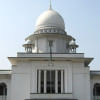Supreme Judicial Council restored
The provision of Supreme Judicial Council (SJC) for the removal of SC judges for misconduct or incapacity has been reinstated in the constitution, the apex court said in its full verdict on the 16th constitutional amendment.
In the verdict released yesterday, the court also came up with a 39-point code of conduct it formulated for the SC judges in exercise of powers under the article 96 of the country's charter.
The article 96 which was scrapped by the 16th amendment deals with the procedure for formation and functions of the SJC and formulation of the code of conduct.
The 16th amendment made in September 2014 had abolished the chief justice led SJC and restored parliament's power to remove the judges. The amendment was challenged with the High Court.
In May last year, the HC declared the amendment unconstitutional and void as it found the changes went against the principles of the separation of powers and the independence of the judiciary.
The government filed an appeal against the HC verdict. In July last year, the Appellate Division of the SC rejected the appeal and upheld the HC verdict.
In the full verdict, the Appellate Division said the independence of judiciary has been undermined and curtailed by making the judiciary "vulnerable to a process of removal of the judges by parliament".
The procedure entailed in the SJC is more in consonance with the spirit of the constitutional scheme, it said, adding that the provision of the SJC is not only for the interest of justice, but also for the independence of judiciary.
Comprising the chief justice and two other senior judges of the Appellate Division, the SJC investigates allegations of misconduct of any judge and makes necessary recommendations to the president for the next course of action.
The original constitution of 1972 had empowered parliament to remove SC judges. But the fourth amendment to the constitution in 1975 scrapped parliament's power and empowered the president to remove the SC judges.
The president's power was curtailed in 1978 through a martial law proclamation and the SJC was introduced. It was ratified and validated by the fifth amendment to the constitution in 1979.
In 2005, the HC declared the fifth amendment illegal but condoned the introduction of the SJC.
In February 2010, the SC upheld the 2005 HC verdict, and said the system of SJC would be valid till December 31, 2011.
Around six months before the provision on the SJC was to expire, the Awami League-led government included it in the 15th amendment to the constitution, allowing the SJC to continue.
But later in September 2014, the AL government abolished the decades-old SJC.
In the full verdict, the apex court also said the independence of the judiciary is the foundation stone of the constitution and as contemplated by article 22, it is one of the fundamental principles of state policy.
The significance of an independent judiciary, free from the interference of other two organs of the government as embodied in article 22, has been emphasised in articles 94(4), 116A and 147 of the constitution, it added.
"Without a political tradition in which members of Parliament could clearly demonstrate that they can act neutrally and impartially if they are given the power of removal and will not be affected by the party's views under article 70, the purported process of impeachment introduced by the 16th amendment would clearly undermine the independence of judiciary and will definitely alter the basic structure of the constitution," said the verdict.
According to Article 70, a lawmaker has to vacate his or her seat if he or she votes in parliament against the party which nominated him or her.
"The object of this article is no doubt discernible that it is to ensure stability and continuity of government and also to ensure discipline among the members of the political parties so that corruption and instability due to political horse trading can be removed from national politics.
"By reason of article 70 of our constitution and its impact on members of Parliament leads to the irresistible conclusion that this new mechanism cannot be expected to function independently and neutrally if a judge attracts displeasure from the political party in power, he may be subjected to removal by parliament," the SC said in the verdict.
Meanwhile, Law Minister Anisul Huq yesterday told The Daily Star he would not comment on the SC verdict without going through the full text.
Attorney General Mahbubey Alam expressed sorrow at the restoration of SJC, saying that system had been introduced by "military rulers".
CODE OF CONDUCT
Formulating the code of conduct, the SC said a judge should participate in establishing, maintaining, and enforcing high standards of conduct, and should personally observe those standards so that the integrity and independence of the judiciary is preserved.
A judge should respect and comply with the constitution and law, and should act at all times in a manner that promotes public confidence in the judiciary, it said.
The SC also said, "A judge should not allow family, social, or other relationships to influence judicial conduct or judgment. A judge should not lend the prestige of the judicial office to advance the private interests of others; nor convey or permit others to convey the impression that they are in a special position to influence the judge.
"A Judge should be faithful to and maintain professional competence in the law, and should not be swayed by partisan interests, public clamour, or fear of criticism," it said.
It added, "A Judge should be patient, dignified, respectful, and courteous to litigants, lawyers, and others with whom the judge deals in an official capacity.
"A judge should dispose of promptly the business of the court including avoiding inordinate delay in delivering judgments/orders. In no case a judgment shall be signed later than six months of the date of delivery of judgment," the apex court said, adding that a judge should avoid public comment on the merit of a pending or impending court case.
"A judge shall disqualify himself/herself in a proceeding in which the judge's impartiality might reasonably be questioned. A judge shall disqualify himself/herself to hear a matter/cause where he served as lawyer in the matter in controversy, or with whom the judge previously practiced during such association as a lawyer concerning the matter, or the judge or such lawyer has been a material witness," it said.
According to the code of conduct, a judge shall not hear any matter if he/she knows or if he/she is aware or if it is brought into his/her notice that, individually or as a fiduciary, the judge or the judge's spouse or children have a financial interest in the subject matter in controversy or is a party to the proceeding, or any other interest that could be affected substantially.
A judge should not engage directly or indirectly in trade or business, either by himself or in association with any other person.
A judge must at all times be conscious that he is under the public gaze and there should be no act or omission by him which is unbecoming of his office and the public esteem in which that office is held, it said, adding that a judge should not engage in any political activities, whatsoever in the country and abroad.
A judge shall disclose his assets and liabilities, if asked for, by the chief justice, it said, adding that a judge should not permit any member of his immediate family, such as spouse, son, daughter, son-in-law or daughter-in-law or any other close relative, if a member of the Bar, to appear before him or even be associated in any manner with a cause to be dealt with by him.
The SC said in the code of conduct that no member of his family, who is a member of the Bar, shall be permitted to use the residence in which the judge actually resides or other facilities for professional work.
A judge shall not enter into public debate or express his views in public on political matters or on matters that are pending or are likely to arise for judicial determination, it said, adding that a judge is expected to let his judgments speak for themselves. He shall not give interview to the media.
The above code of conduct and the ethical values to be followed by a judge, failing which, it shall be considered as gross misconduct, the SC said in the verdict.

 For all latest news, follow The Daily Star's Google News channel.
For all latest news, follow The Daily Star's Google News channel. 







Comments